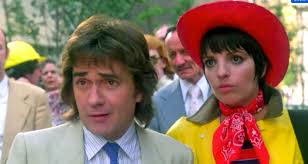Off-List: Arthur
The third
off-List movie of 1981 is “Arthur”. This was a suggestion of my wife, who loved
this movie in her childhood. For me, this was first time I watched it and I do
not think I had even heard about it until my wife mentioned it. So, a good
opportunity to expand my horizon and watch a movie together.
“Arthur” is
a comedy about a playboy, Arthur Bach (Dudley Moore), who refuses to grow up
and take responsibility for his life but drowns his insecurities in copious
amounts of alcohol. We learn that he is fabulously rich with family money, but
that it is really his parents who are calling the shots. Arthur has people to
do all his work, Mr. Hobson (John Gielgud) his butler and Mr. Bitterman (Ted
Ross) his chauffeur, and everywhere he goes, nobody refuses him, smiles and
mocks him when he leaves again. He lives in a bubble of money and no responsibility.
He hates it, but is unable to do anything about it, but drinking. And drinking
he does.
At the opening
of the movie, we see him cruising through town with Mr. Bitterman and picking
up hookers. He takes one of them to an expensive restaurant and makes a scene
just to set the stage. At home, Mr. Hobson is clearly familiar with the scenario,
gets the girl out and tries to boost a bit of adult sentiment into Arthur,
though largely failing. Arthur does love Hobson like a father, but it is always
easier to dodge responsibility. A crisis, however, is looming on the horizon.
Arthur’s parents have found a wife, the well-connected Susan Johnson (Jill
Eikenberry), for Arthur and he must marry her or get cut off from his wealth.
This is
where the magic starts happening. Arthur meets Linda Marolla (Liza Minelli)
while she is stealing a necktie from an expensive shop. He is fascinated with
her and her devil-may-care attitude and steps in when she is apprehended by the
shop detective. Athur falls in love with this person who cannot be bought and is
finally doing something on his own, unfortunately at a time when it is almost
too late. Will Arthur truly man-up or is he doomed to an
unhappy marriage?
What makes “Arthur”
a comedy is the shenanigans of Arthur when he is drunk. His drunken antics are
played to full effect and against an audience who is sober and very proper, so
Arthur is like a bomb in a stuffed-up society. That is kind of funny, and
definitely the sort of fun that from a child’s perspective works as hilarious. Unfortunately
for me, I have found as I get older that drunk people are only really funny
when you are drunk yourself and watching Arthur get stiff is almost painful. It
is clearly a shield against the world and rather than enjoying his jokes, I
feel his pain and despair. Poor rich kid is a cliché, and I know it is
difficult to feel truly sorry for somebody with this much resource behind him,
but Arthur is a sad case. The victim of always taking the easy way and throwing
out your dignity in the process.
In another
decade, “Arthur” would be a tragic or at least a moral tale, but in the early
eighties (as in the early thirties) there was a window where this could be a
comedy that actually worked. I can see it as funny and I can see the appeal,
but the alcoholism element just means that it has not aged well. It feels almost
inappropriate, yet my anarchistic side thinks that is actually a plus.
Gielgud won
an Academy Award for best supporting actor and the theme song (by Burt
Bacharach) won the award for Best Original Song. And it is a very catchy tune
indeed.
I do love
my eighties comedies and I want to like this, but maybe not so much as a comedy
but as a social commentary.

There's a reason that the remake of this didn't work, and it's because this is a movie that is very stuck in its own time.
ReplyDeleteI can only agree on that. The more I think about it, the more I wonder if it worked for even the early eighties. I think it is everything else but the Arthur character that worked here.
Delete